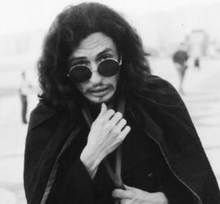Torquato Neto
Torquato Neto , actually Torquato de Araujo Neto (born November 9, 1944 in Teresina , Piauí state , Brazil ; † November 10, 1972 in Rio de Janeiro , Brazil) was a Brazilian artist who worked as a lyricist, lyricist, critic, columnist, actor , Director and journalist. He is considered one of the most important figures in tropicalismo .
Live and act
Neto came from a middle-class background; one of his cousins was temporarily Minister of Justice in Brazil. He first attended a school in Teresina, where one of his classmates and friends became the world-famous singer Gilberto Gil , then moved as a teenager to Salvador de Bahia , then in 1963 to Rio de Janeiro, where he spent the rest of his short life, apart from stays abroad. In Rio he studied journalism and philosophy unsuccessfully and remained without a degree. There he also worked in various jobs, including working as a copywriter and as an employee at Rio's Santos Dumont Airport . He was also active as a columnist and critic for various newspapers and magazines and maintained regular, well-read columns and was a film and music critic. He wrote for newspapers and magazines such as Correio de Manhã , O Sol and Última Hora . He was also the founder of magazines called Flor de Mal or Presença .
During the first years of the military dictatorship in Brazil (1964 to 1985) he lived temporarily in Paris , New York and London . Neto spoke fluent English, French and Spanish in addition to his native Portuguese. In 1969 he even met Jimi Hendrix in London . In the same year he returned to Brazil.
He was and is known in Brazil primarily as a songwriter. Many of these texts were sung by well-known Brazilian singers such as Gilberto Gil, Maria Bethânia , Daniela Mercury , Gal Costa , Nana Caymmi or Caetano Veloso , to name the most famous. Some of the songs had titles in English or Spanish. Many of the songs later became classics of Brazilian pop and rock music. Many of the lyrics are dark and melancholy at times; they are mainly shaped by the years of the military dictatorship. The best known songs to which he contributed lyrics were: "Geleia Geral", "Marginalia 2", "Mamāe Coragem", "Deus vos sobre esta casa santa", "Go back", "Dia D", "Aqui eo fim do Mundo "and" Copacabana ".
In the last years of his life he fell into severe depression, which was mainly exacerbated by his well-known alcohol consumption, psychological and professional difficulties and the pressure of the military dictatorship. On November 10th, the day after his 28th birthday, he went to the bathroom and committed suicide with gas. He left behind his wife and two year old son Thiago. He was buried at the Cemetério Sāo José in Teresina.
Aftermath
- Since 1984 there has been a Premio Torquato Neto para monografias , which is awarded to authors of monographs .
- His songs are still played and sung in large numbers today.
- Some books on the life and work of Neto have been published in Brazil.
Trivia
The eccentric poet's trademark was his long, flowing hair, a cloak he wore for the last few years, his extravagant glasses and his beard.
plant
Filmography
- Barravento, (Director: Glauber Rocha ), works as assistant director and second director.
- Nosferatu (Brazilian version), actor.
- O Terror da Vermelha (as a director and screenwriter).
Fonts
- Os ultimos dias de Pauperia , (posthumous), 1984; includes all poems, many lyrics and articles by Neto for the first time as a book.
swell
- http://anos60.wordpress.com/2009/04/03/mortes-tragicas-no-universo-rock-torquato-neto/
- http://www.dicionariompb.com.br/torquato-neto/biografia
- http://osuicidario.blogspot.de/2012/05/candelabro-aceso-para-torquato-neto.html
- http://tropicalia.com.br/ilumencarnados-seres/biografias/torquato-neto
| personal data | |
|---|---|
| SURNAME | Neto, Torquato |
| ALTERNATIVE NAMES | Araujo Neto, Torquato de (real name) |
| BRIEF DESCRIPTION | Brazilian artist |
| DATE OF BIRTH | November 9, 1944 |
| PLACE OF BIRTH | Teresina , Piauí State , Brazil |
| DATE OF DEATH | November 10, 1972 |
| Place of death | Rio de Janeiro , Brazil |
